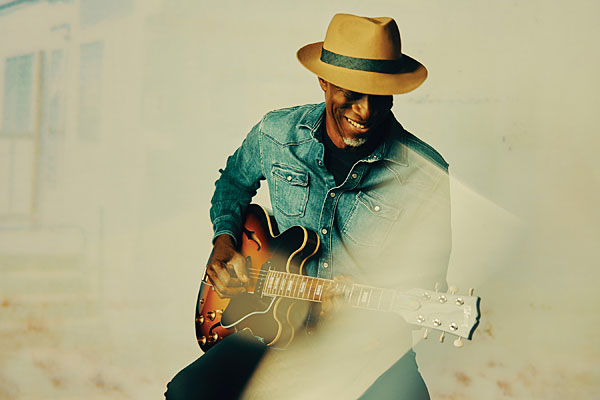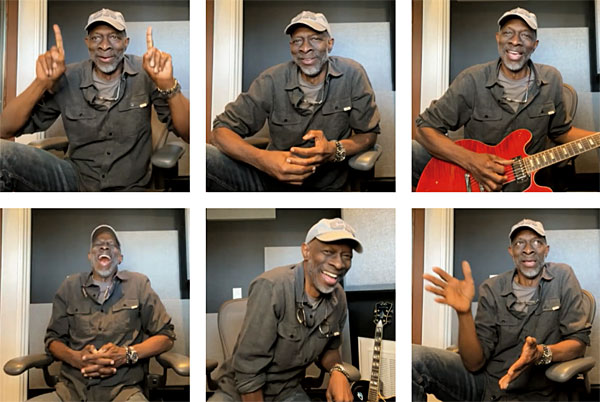| Columns Retired Columns & Blogs |
I remember him performing in Groningen (Netherlands) as the opening act for Lenny Kravitz. I liked it and bought the CD a couple of years later because of that.
Not that Moore is desperately trying to force huge commercial success. But he's bullish by choice.
"It seems to me that when I'm having my most positive thoughts, the best things happen to me. That has nothing to do with what anybody thinks of me or doesn't think of me. If I need something, you can't keep it from me. If something is mine, you can't take it from me. And if it's not mine, I won't be able to keep my hands on it. But it'll keep coming, just keep coming to me, like music kept coming to me. Music was mine to experience."

Metaphysics and consciousness
Since his early 20s, Moore says, he's been reading self-help books. He credits the tomes with his generally jovial and optimistic disposition. "Metaphysics, consciousness, how the mind works. Deepak Chopra, and Gary Zukav, and Don Miguel Ruiz. ... I kept reading those books over and over, to undo the negative thinking surrounding me. I believe that helped me ward off any excuse for failure, or anything where I would feel like someone's against me. Even if I'm the stupidest guy on the planet, anything that anybody thinks of me has nothing to do with what I can do in my life. I don't give my power away like that."
Sounds like he's got his mojo workin'.
Circling back to his minirant about critics, he turns conciliatory—sort of. "I like a guy who speaks his mind like that. Reminds me that one day, after I'd moved to Nashville, they offered me a decent fee to play at a Fourth of July celebration, and I said sure. Then a journalist from a local paper asked me, 'What does the Fourth of July mean to you?' I said, 'Don't mean nothin' to me; it's just a day off to get some barbecue. I didn't get my independence on that day.' And they put it in the paper. 'Keb' Mo': The Fourth of July means nothing to him.' Which was accurate. Why should I celebrate that day? People are happy about their independence, but back when they got it, black people were still in chains, picking cotton, getting their asses whupped. I love America, don't get me wrong. It's the best place for me. But I'm not gonna mince words."
Barbs like that are more common from Moore than people who accuse him of blandness may realize. Notwithstanding songs like "God Trying to Get Your Attention" and the gospel-tinged "Hand It Over," he's no longer a Christian, and he doesn't mind rattling Christ followers from time to time. A few years ago, he released a satirical song and video titled Christmas Is Annoying, complete with ugly sweaters and a Jesus figurine that Moore lifts mockingly to the heavens. In "Stand Up," a song about taking action against injustice, he sings "Don't wait for Jesus, he ain't coming back no more."
"That line went over like a lead balloon," he says. "But come on, how long has it been 2000 years already. And last time, Jesus got hung on the cross. So, I wouldn't be in too much of a hurry if I were him."
All the same, he acknowledges his musical debt to his upbringing in the Baptist Church. "The voices there were just marvelous. Nothing but great singers. I have what they call a voice of the people. It's like a Dylan or a Springsteen voice, or a Gil Scott-Heron voice. It's not a Michael Bublé voice. It's just a guy singing, and I'm comfortable with that."

Sometimes, he has found, a great singer can be tiring. "Because it's all these big moments all the time, and big high notes, so the singing becomes the thing, rather than the songs."
That guttural moan
Does he feel that the blues is still malleable enough today that it can be shaped into something new and exciting? No question.
"People think of it as three chords, as a pattern. But it's a feeling. When you listen to Robert Johnson, Reverend Gary Davis, Elizabeth Cotten, all those people who after working all day sat down and played the guitar—it's that feeling that makes it like that. Like the way Robben Ford does 'Ain't Got Nothin' But the Blues,' and when Johnnie Taylor sings 'Last Two Dollars.' ... When you hear Son House singing 'Death Letter' and Howlin' Wolf doing 'How Many More Years,' ... it's a thing, man. There's a moan that came out of slavery, that came out of the cotton fields, that came out of the ships coming from Africa, that's about desperation and hopelessness turned into hopefulness. That is the blues and the gospel. That guttural moan—when you do that sound, you don't even have to say words. You just go (half-moans, half-hums a doleful, wordless blues tune), people know exactly what you're talking about."
But, looking ahead, can the genre still be innovated? Reinvented?
"Sure! Taj Mahal, when he was coming up, people told him they didn't think the blues would last, that there was no future in it. But he kept it going practically single-handedly—and he was innovative at the same time. Just when you think that the blues is going away, here comes Jontavious Willis, and Kingfish"—he's talking about blues-guitar phenom Christone "Kingfish" Ingram—"and Gary Clark Junior. And Larkin Poe. The Fantastic Negrito. The spirit of the blues, it always grabs somebody."
Get it now
Moore's own creativity and innovation lies partly in how he makes his albums sound. Frequently, there's an unusual-sounding instrument in his lush, airy mixes. "I bought a little amplifier last week that sounds like crap. It has this kind of bark to it that sounds different and interesting. I know I'll use it at some point. Every record I make, I try to subtly move into a sonic atmosphere that's a little different than before."
For each recording, Moore selects the instruments he needs from a large locker in his home studio. "I'll pull down some things. It's like picking clothes: I'll get that shirt, those pants. So, I get that guitar, and that other one, and that mandolin. ... Those will be the core instruments I make my record with. A few years ago, I bought an octave mandolin, and that became the main instrument I use on the music for B Positive, the TV show. They always want a unique sound. I was just sitting around banging on that thing for a couple of years. Now it's finally got its use."
I asked how come most of his albums sound so good, with well-defined spaces for each instrument and a lack of excessive effects and compression. He laughed, because it all started with a remarkably lo-fi tool.
"Most of what I know about recording I learned on a Tascam four-track cassette machine. I went right to the manual, and the first thing it talked about was the importance of mike placement. And while you were recording instrument tracks, you had to EQ carefully—all you had was one treble and one bass control—and see how much room you had to scoop out to get the vocal to sit on top. A while later, when I was a songwriter and demo producer at A&M Records, I got to work with guys who really knew what they were doing. Supertramp came in to record some of their albums, and I wasn't a part of that directly, but I listened to the conversations in the hallway, about how they're recording things, where they're putting the mikes. Over time, I learned how to voice instruments, so they don't bump into each other in the mix."
He insists that the sound mix starts the moment you hit the record button. "Now, a lot of artists will just jump in, get everything down, 'We'll mix it later.' No, get it now. Record it right the first time, because otherwise you're going to be chasing your tail. Who knows how long you'll be trying to get it to sound good."

You're standing on it
Moore is not one to rave about the virtues of high-end audio. "When you listen to old scratchy records, you don't need a really fancy stereo," he chortled. Nonetheless, he loves his Adams Audio S3X-H studio speakers, powered midfield monitors that cost a cool $8000 a pair. For headphone listening, he prefers "those Bose lockout 'phones"—noise-canceling ones. "They just broke on me. I'll probably get another pair."
But the audio gear that takes him deepest into music is the Elliot Scheiner–designed system in his Acura RLX (footnote 3). Scheiner is the celebrated engineer and producer who collected eight Grammys for his work with artists like Sting, Steely Dan, Foo Fighters, Beck, and Paul Simon. "It never lies," Moore said of his Acura setup. He bought the car because of it. "When you make music, you want it to ride good in the car," he laughed. "I like the rumble of the road. It makes some instruments sound so fine. For instance, a Hammond organ is great in a car."
We were about to hit the two-hour mark of the interview when talk turned once more to his midlife career restart.
"People say, 'It was a turning point, how did you do it?' Well, I walked a little ways, and I caught a bus a little ways, and I rode a mule a little ways, and I racked up a lot of road miles. Every step was an experience, and every experience was a step. After a while, like now, I can see the progression of life, how things panned out. Somehow everything was just perfectly arranged, all the way up to today."
That's why his favorite movie is The Wizard of Oz, he told me. "Because when the question is, how do you get to Emerald City, the good witch says, 'Follow the yellow brick road.' And where do you find that road? 'You're standing on it,' she says. You're standing on it! You know?"

I remember him performing in Groningen (Netherlands) as the opening act for Lenny Kravitz. I liked it and bought the CD a couple of years later because of that.

Sounds like he turned out OK :)
I'd bought that first CD back in '94 but then lost the scent afterwards. I'll have to check the others out.
And this White guy knows exactly why he asked the question.